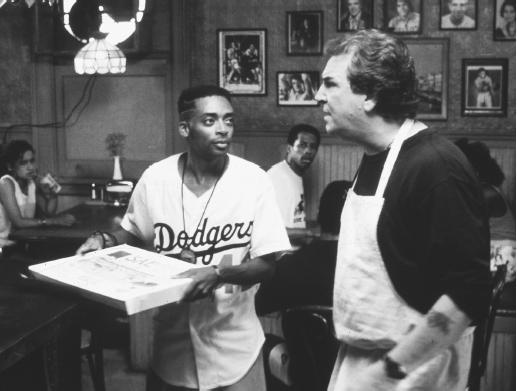
Did Mookie do the right thing? I think everybody wants there to be a definite answer, yes or no, but these types of situations are not black and white. Like so many things in life, the right thing is a shade of gray and ultimately no answer will be satisfying (otherwise why would people still be arguing over this?). But I feel Mookie did the better thing by throwing the garbage can through Sal’s window, not because he needed to take revenge on Radio Raheem, but rather it prevented a dangerous situation from taking more lives. I proposed this idea in class, and was relatively shot down, but considering nobody else has come up with anything that provides REAL closure I’ll stick with my own observations.
Spike Lee was quick to point out on his DVD that critics cared more about the loss of white property than the death of Radio Raheem. This is wrong and there’s no way to argue that. However, in developing my theory, I think it’s also important to note that Radio Raheem nearly killed Sal, but nobody really cares about that either. If Radio Raheem was not killed by the cops, he still was going to be put in jail. Point being he was not coming back (this doesn’t condone him being killed though). After Radio Raheem died and the cops departed, they left a red hot crime scene where Sal and his two white sons were surrounded by an entire grief-stricken black neighborhood. They had nobody to protect them. Just the three of them (cornered against the pizzeria) versus an entire community.
What followed was Mookie threw the garbage can through Sal’s window and the riot broke out. Nobody can tell for certain WHAT WOULD HAVE happened had he not done that, but I don’t think many people believe Sal or his pizzeria could have escaped untouched. By throwing the garbage can through the window, Mookie diverted attention from Sal to the pizzeria and everybody was able to vent their pain on inanimate objects. Sal and his boys were allowed to walk away untouched (although they were still banged up from the fight before) and watched their home burn down from across the street. Was Mookie right to throw the garbage can through the window? I think the loss of Sal’s pizzeria is better than the loss of Sal’s life/health. Only one person died in that entire scene (Radio Raheem). Had Mookie not thrown the garbage can, that number very well could have been a lot higher.
Obviously there are holes in this argument. As I said in the beginning, nothing is black and white. Some things after the riot scene may contradict the theory, but hopefully it allowed you an alternative way of interpreting the end of the movie.
